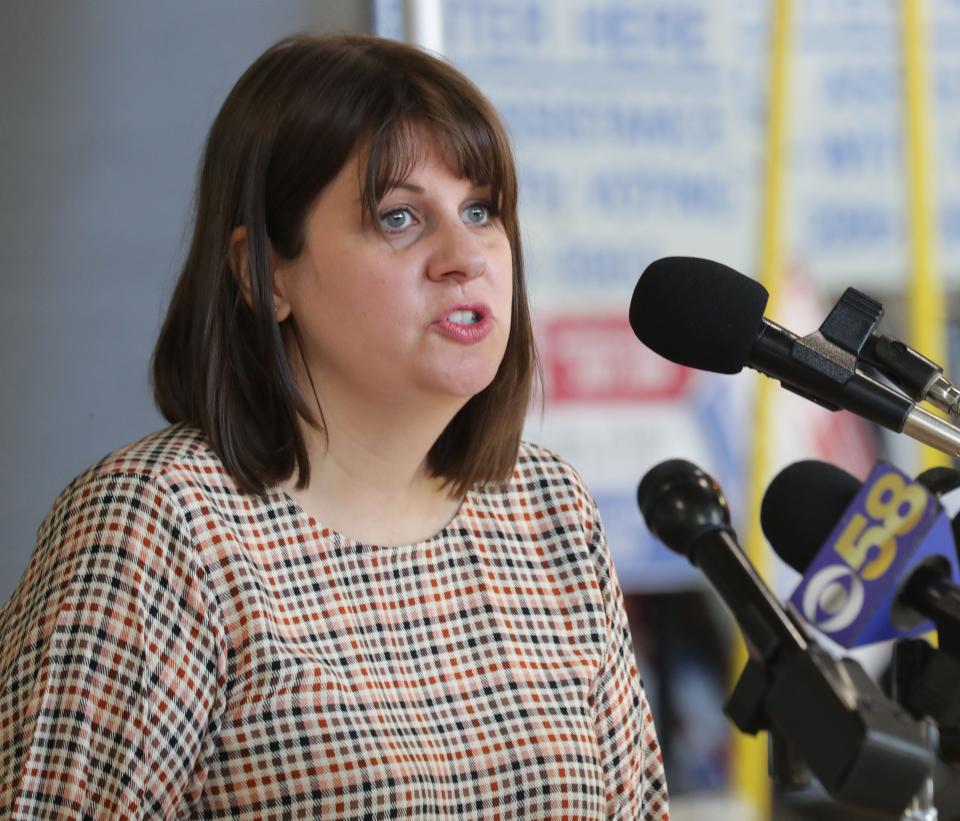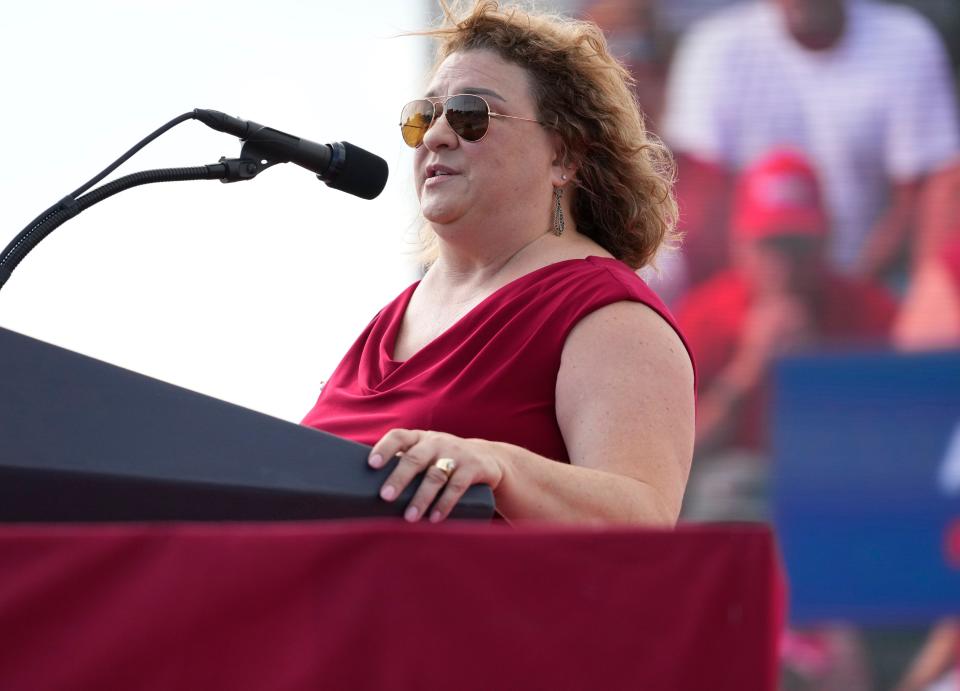What we know about the Milwaukee election official charged with fraud and the lawsuit over military ballots
A now-fired Milwaukee elections official told investigators she requested three military ballots in the names of voters who do not exist and had them sent to a state lawmaker's house.
Now, a veterans group and that lawmaker, Rep. Janel Brandtjen, are suing the Wisconsin Elections Commission to block the immediate counting of military ballots in Tuesday's election.
They argue that the actions of Kimberly Zapata, the former Milwaukee Election Commission deputy director, demonstrate "a vulnerability in Wisconsin’s military absentee ballot process."
Here's what we know about the situation.
Who is Kimberly Zapata?
Zapata, 45, of Milwaukee had been with the Election Commission for about seven years and the city about 10, Milwaukee Election Commission Executive Director Claire Woodall-Vogg said.
She was appointed deputy director of the Election Commission this summer.
Her job duties as deputy included supervising registration and all aspects of absentee ballots.
Zapata's termination means Woodall-Vogg will instead oversee the city's central count operation, where all the absentee ballots are tallied on Tuesday.
Her annual salary as deputy was $87,666, according to the city.

Was a Milwaukee elections official charged?
Zapata was charged on Friday with misconduct in public office, a felony, and three misdemeanor counts of making a false statement to obtain an absentee ballot.
If convicted, Zapata faces up to 3½ years in prison and a $10,000 fine on the Class I Felony count and six months behind bars and a $1,000 fine for each of the three misdemeanors, according to the complaint.
Her initial appearance is scheduled for Nov. 28.
What do prosecutors allege Zapata did?
The criminal complaint states that Zapata went on the MyVote website from her home about 5:30 a.m. Oct. 25 to create the fake voters, submitting three applications under three different names at randomly chosen addresses in Shorewood, South Milwaukee and Menomonee Falls.
She used her city-issued laptop for the applications and found Brandtjen's address in the state voter registration database that is administered by the Wisconsin Elections Commission and is only available to municipal employees.
More:Tight elections feel normal in Wisconsin. Here is what makes this one so unusual
More:The 6 questions the Nov. 8 election will answer about Wisconsin politics
After Brandtjen received the ballots and spoke publicly about it, Woodall-Vogg sent Zapata an article on the situation. Zapata denied knowing what it was about.
Later, Zapata approached Woodall-Vogg and said she had created the fake voters and sent the ballots to Brandtjen to show how easy it is to commit fraud, according to the complaint.
Why do prosecutors say Zapata requested the ballots?
The complaint states that Zapata wanted to redirect Brandtjen's focus "away from outrageous conspiracy theories and to something that is actually real."
It also states that "Zapata stated that she felt overwhelmed due to the threats of violence the Election Commission was receiving, in addition to the constant daily harassment and accusations of lying and hiding things. She stated she wanted the truth to come out so that they could focus on the actual problems."
She also said she was trying to highlight flaws in the election system in an attempt to maintain election integrity, according to the complaint.
How has state Rep. Janel Brandtjen responded?

As chairwoman of the state Legislature's elections committee, Brandtjen has repeatedly held hearings promoting false claims of voter fraud and 2020 election conspiracy theories.
After she received the three military ballots, Brandtjen said she contacted law enforcement and former Supreme Court Justice Michael Gableman, who oversaw a partisan review of the 2020 election. The review found no evidence that the 2020 election was incorrectly called.
Gableman is listed as an attorney in the lawsuit filed Friday to sequester military absentee ballots, and Brandtjen is a plaintiff.
Brandtjen previously said she believed the person who sent her the ballots was copying the actions of a Racine County man, Harry Wait, who is charged with two counts of election fraud.
Wait, who requested absentee ballots for Assembly Speaker Robin Vos and Racine Mayor Cory Mason, has said he wanted to prove election fraud is possible and that fraud robbed Donald Trump of a victory in 2020.
Last week, Brandtjen suggested Zapata's actions shed light on problems that lawmakers need to address.
"We have uncovered so many issues that demand attention. I have been attacked by the liberal media, Democrats who benefit from the system, and Republicans who don’t have the backbone to take on the issues, including Speaker Vos, who has referred to me as a conspiracy theorist," Brandtjen said.
What was the result of the military ballots lawsuit?
A Waukesha County judge denied a request to block the immediate counting of military ballots, calling the step a “drastic remedy” but also chiding the Wisconsin Elections Commission over its guidance to municipal clerks.
Attorneys from the Thomas More Society asked the court for a temporary restraining order and a temporary injunction to sequester all military ballots and stop them from being counted — until officials can verify they are legitimate and match current lists of military voters.
The next court hearing is set for January.
What did the military ballots lawsuit allege?
The attorneys argued that the Wisconsin Elections Commission's guidance to local election clerks on military ballots does not align with state statutes. Clerks should have up-to-date, accurate lists of military electors, the suit states, and the Elections Commission does not mention such lists in its military and overseas voting manuals.
Do members of the military need to register to vote in Wisconsin?
Military voters are not required to register before voting in an election and do not need to provide proof of identification or residence to request an absentee ballot. Like other voters, military voters can request an absentee ballot using the myvote.wi.gov website.
How have veterans groups responded?
The Washington, D.C.-based Union Veterans Council has filed to intervene in the case. Executive Director Will Attig said he is afraid the suit is "a canary in the coal mine" of similar suits to come around the country.
"This is a combined effort to sow doubt around the election, and they just picked military members as a pawn, as a tool to do that," Attig said. "This is just an outrageous attack that is completely unwarranted."
Who would be affected?
Three groups of people would be affected by this lawsuit, Attig said: active-duty military members stationed on bases around the U.S. and the world who want to continue to vote in Wisconsin; those who are deployed; and National Guard members who are away from home for extended periods of time for training or other orders.
Daniel Bice, Alison Dirr and Molly Beck of the Journal Sentinel staff contributed to this report.
Our subscribers make this reporting possible. Please consider supporting local journalism by subscribing to the Journal Sentinel at jsonline.com/deal.
DOWNLOAD THE APP: Get the latest news, sports and more
This article originally appeared on Milwaukee Journal Sentinel: What we know about the Wisconsin lawsuit over military ballot fraud

